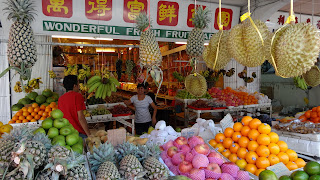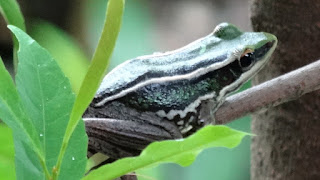Callum, my old chum from primary school
in Scotland, has kindly invited me to stay with him at his very
different Singapore Residence.
It is an apartment in the Wessex
Estate, one of the few post-war housing complexes still in existence
in Singapore. Built to house non-commissioned officers and their
families during the Malayan emergency, the 26 three-storey blocks are
each named after British victories – Khartoum, Quebec and, in
Callum's case, Barrosa.
The apartments are set in spacious
grounds and there's a real feel of old-style colonial living. Even
more so is the Col Bar, originally built in 1953, but moved to its
present site in 2003 when a major road was planned right through the
middle of the building. The Colonial Bar, to give it the full title,
is as unlike modern Singapore as is possible to get, so is popular
for that very reason. But if you want to eat, get your order in by
8.30pm or the chef will have gone home!
In the morning, I join the commuters on
Singapore's smashing Rapid Transit, the SMRT, to head to Changi
Airport. The trip, which takes 50 minutes. Costs just $2.20.
Singapore doesn't seem to ever have the
horrendous immigration queues of the USA and the UK. Both going in
and out takes no time at all. Changi Airport is great, with trolleys
everywhere and free wifi - as long as you ask for the password at the
information desk.
I'm impressed with Air Asia. My eighty
minute flight on a spotlessly clean Airbus has cost me just £48
return, the vast majority of that being fuel or security surcharges
and taxes. The staff are really friendly, boarding is professionally
handled and, for a 'no frills' carrier, they do it very well indeed.
Just before touch-down at Kuching, the
plane passes over the winding Sarawak River. Everyone, even Malaysian
Nationals, has to complete an immigration form for Sarawak, on Borneo
Island,
but, with no bag to collect, the
paperwork is completed within moments.
Fauzi and Amanda have turned up in the
Four Points by Sheraton limo, which is a really nice touch.
The hotel is only a few minutes drive
away. I have rented a junior suite, which turns out to be one of the
biggest rooms I have ever had in my life. The price, about £40 per
night, is about half what I paid for my Bed and Breakfast room in
Melbourne!
But there's no time to linger because
Hadi, my driver and guide, is already waiting for me in reception to
show me down town Kuching.
It's an interesting mix of tumbledown
and ultra-modern. But whoever planned the itinerary, sending us into
town at the end of Friday Prayers clearly hadn't thought it through.
Nightmare traffic jams!
We see the impressive town hall,
Chinatown, where I by a kilo of sweet little bananas for about 50
pence and visit the colourful and lively bazaar. Long overdue for a
haircut, Hadi takes me to a barbershop he knows, where I have an
excellent cut for just £2. Already, it is clear that Sarawak is not
going to be an expensive visit.
I ask Hadi if he's Malaysian but he is
firm that he is a Sarawakian first and formost. Sarawak is actually
the largest state in Malaysia and home to 2.2 million folk, a quarter
of whom live in Kuching. Borneo island, the third largest in the
world, includes Brunei and, in the south, it's part of Indonesia.
After a swim in the hotel's pretty
unimpressively designed pool, I walk across the road where I enjoy an
excellent meal at the Pandan Thai Delight Restaurant for just over
£10. Green lamb curry, spring rolls, crab cake, rice and a couple of
beers. What a bargain.
In the morning, much as I detest buffet
breakfasts, I actually enjoy the wide range of local and western fare
on offer in a pleasantly quiet restaurant. The high-spot for me is
Beef Rendang, a very spicy beef stew. Great on buttered toast! But I
could have had anything from nasi goreng to scrambled egg.
I hand in a kilo of washing to the
laundry across the street, who charge me 4 Malaysian Ringgit, less
than £1. It will be ready by teatime. If I had had the items
laundered individually in the hotel, I would have paid twenty times
that.
Since Melbourne, I have been in agony
with a trapped nerve in my neck, which is causing me pain all down my
left arm, so I visit the pharmacy. Priscilla Chuo Poh Poh, who learnt
her trade at Strathclyde University in my hometown of Glasgow, is not
yet in, so I talk to her on the phone and she dispenses accordingly.
I pick up what I think is one of her business cards, only to find out
later that it is for a doctor Chen Chung Ming, who specialises in
Colorectal and Laparascopic treatments, something he learned to do in
Edinburgh. I shall bear him in mind.
Mr. Hadi takes me to the Semenggoh
animal sanctuary who decide to charge me the entrance fee, despite me
being an official Sarawak Tourist Board sponsored visitor. But
apparently we don't have 'the correct letter'. Hey ho.
But it's feeding time for the Orang
Utans and we watch in wonder as six of the hairy red animals swing
through the jungle canopy. On departure there's a real bonus when
Hadi spots a mother and her baby pottering along the side of the
path, completely unconcerned about us.
It's hard to describe how hot and humid
it is, but I am glad I have brought a wet flannel and lots of water.
Even so, I buy three cold drinks in the Serikin Market, very close to
the border with Indonesia. There's a lot of basket ware, rush matting
and really good quality fruit and vegetables on display, but it is
really too hot to linger. Sensible locals use brollies as parasols.
Then we have to visit the bloody
pottery factory. God! I have lost count of how many trips I have been
on that insist on including the sodding pottery factory in the
itinerary. There must be a tradition of potters paying tourist boards
backhanders or something. It's always the same old rubbish; rarely
anything of any real quality. And this was no exception. But there's
a bit of fun when I spot one of the assistants fast asleep in an
armchair, which amuses the other staff when I take his picture.
In the late afternoon, I have a late
lunch at the Taipei 101 restaurant, where lemon chicken, special
fried rice and a couple of Tiger beers is less than £5. In my room,
Football Focus is on BBC World. Imagine! I am in Borneo watching
Premiership action, hours before the programme is aired in the UK.
The Sarawak Cultural Village sounds
totally not my sort of thing, a real tourist trap. But we have
pitched up early and it's actually very well done, with some really
interesting traditional homes to see and folk in their tribal
costumes going about their daily business. They are all really
friendly and happy to chat. One man is doing some colourful batik
prints while a lady is making tasty biscuits over a charcoal fire
from coconut milk and flour.
Hadi spots a lovely bright green
chameleon in the foliage, who waits patiently for me to set up my
tripod before scuttling off after I have taken the snap.
I am told that Singapore would take a
dim view if I purchased a blowpipe, so I buy a few bags of pepper
instead. I don't think I have ever seen it growing on trees like it
does here.
We visit a couple of quiet little
fishing villages, where the locals all wave and say hello and boys on
bikes show off their wheelies.
At Buntal Bazaar, a light lunch is
taken for less than £3.
Final port of call is to the Orchid
Garden in Kuching where I learnt that 10% of the world's orchids come
from Sarawak. There are apparently 75,000 of them in the 35 acres of
the garden, but there are only a few in flower at this time of year.
I have been hoping for a swim, but just
as I am about to go down, the skies darken, the heavens open and a
tropical monsoon ensues. It's pretty scary being high up in a hotel
watching the lightning sear across the leaden skies.
In the morning I make another attempt
to see Priscilla the Pharmacist, but she's clearly not an early
riser. Once again I speak to her on the phone about my ailments. I
think it's lovely that the girl in the shop refers to her as madam.
It wouldn't happen in Glasgow, Priscilla!
Air Asia returns me to Singapore, where
I clear immigration within moments.
I have been invited to spend a couple
of nights at the eco-friendly Siloso Beach Resort on Sentosa Island.
Karl and Zac take me on a fascinating
hour-long tour , available to all guests, which really does
demonstrate the resort's credentials.
Wherever possible, trees were kept in
place during the building of the complex. So much so, that trees
actually grow in the middle of some of the 12 villas. The main
accommodation block is actually split in two to allow large trees to
be kept in place.
They grow their own fruit and
vegetables, fertilised with compost produced from waste product in
their own wormery.
The huge 95 metre long swimming pool
uses ionized salt instead of chlorine to kill any bugs therein and
the water comes from an underground spring, which is also used in the
gardens. There are fourteen ponds to encourage wildlife, a huge
rooftop garden which acts as insulation, thus saving huge amounts of
energy.
The Siloso Beach resort's eco-friendly
policy goes far beyond anything I have ever seen before, ranging from
the way they source their food (locally wherever possible), no
wasteful plastic bottles of soap and conditioner in the rooms to the
housekeeping staff recycling the contents of guests bins.
It's all very impressive.
But actually what is nicest (and
probably the thing that most guests notice) is the way that the
complex just seems to fit in with the natural environment It really
does give you the impression of living in the middle of the jungle.
I enjoy a quick dip in the enormous
pool before a quick bite of lunch with Rae and Ching, the PR team at
the next door Shangri-La Rasa Sentosa resort.
Now I have to re-pack my bags for the
12 and a half hour flight to Geneva and my first experience of flying
in an Airbus A380.
Something I am looking forward to,
almost as much as if it was to be my first flight ever.
Well, if you have the travel bug, it
really doesn't matter what age you are, the thrill is just the same.
If I didn't get the buzz out of travelling as much as I do, I'd stay
at home digging the garden.
And trying to be eco-friendly.
All photos at:
All photos at:
 |
| Around the World in 60 Days Backwards - Australia and the Far East to the UK |






























No comments:
Post a Comment